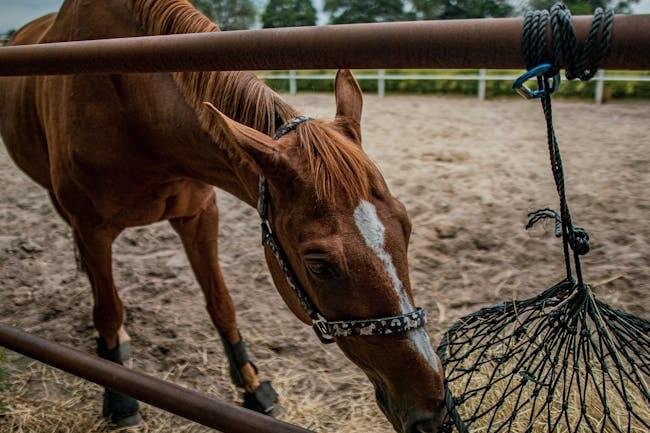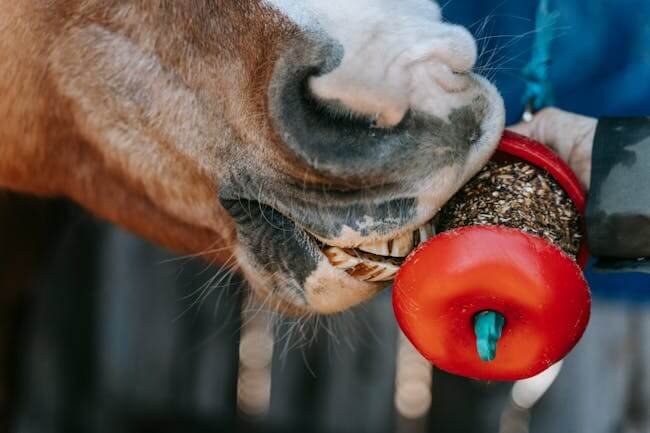A horse requires both proper health care combined with proper nutrition for maintaining optimal physical state and improved performance abilities and longer life duration. The guidance explores fundamental horse health care elements while discussing sustenance provisioning together with standard medical conditions and safeguard procedures.
1. Essential Nutrients for Horses
A healthy foundation exists between nutrition and horse well-being. The complete health of a horse relies on several essential nutrients that include:
- Water – Water remains a constant requirement for horses since they need continuous access to clean, fresh water. Each day average horse’s consumption ranges between 5-10 gallons, yet drinking quantity depends on their environment and physical activity intensity.
- Carbohydrates – Horses gain their main energy from carbohydrates, which appear in pasture grass and hay, along with grains.
- Proteins – The development of muscles and tissue healing requires proteins found in legumes and alfalfa as well as soybean meal.
- Fats – Horses obtain concentrated energy from fats, which also support their coat health through vegetable oil and rice bran consumption.
- Vitamins – Include Vitamin A (vision, immune health), Vitamin D (bone health), and Vitamin E (antioxidant properties).
- Minerals – Calcium and phosphorus for bone strength, sodium for electrolyte balance, and trace minerals like zinc and selenium for metabolic functions.
Saving Tip: Shopping for English saddles? Keep an eye out for Horse Saddle Shop coupon codes to score significant discounts on your purchase.

2. Common Horse Health Concerns
The healthcare of horses requires immediate identification followed by the prevention of typical health problems.
- Colic – The digestive condition called colic presents serious danger to horse health. Horse owners must ensure three key elements of diet and exercise, and hydration to prevent this issue.
- Laminitis – The hoof suffers from inflammation called laminitis, which develops mainly from eating excessive sugar or becoming too obese. Proper diet management combined with suitable hoof attention serves as treatment.
- Equine Influenza – A contagious respiratory infection. The combination of vaccination together with proper hygiene practices prevents disease outbreaks in the population.
- Parasites – The presence of internal worms and external ticks and lice results in malnutrition and disease conditions among horses. The implementation of regular parasite treatments and proper combing stands is an essential practice.
- Dental Problems – The consequence of mismatched tooth distribution results in impaired chewing ability, which leads toward weight reduction among horses. Regular dental check-ups prevent issues.

Horse Eating Snack
Read also:
English or Western Horse Saddles, Which are More Comfortable?
Western Vs English Horse Harnesses: Know the Differences
5 Best Horse Trailer Brands
3. Preventive Health Care Measures
Proactive healthcare methods guarantee that horses will remain healthy and perform well in the long term.
- Vaccinations – Continuous immunization protects equine health against tetanus, together with rabies and West Nile virus infections.
- Deworming Schedule – A controlled wastewater treatment strategy that increases based on stool egg numbers will stop parasitic infections.
- Hoof Care – Hoof care treatment includes routine hoof trimming followed by shoe application to stop diseases from occurring. A farrier must inspect hooves at intervals between four to eight weeks.
- Exercise and Conditioning – Movement through exercise and training practices ensures healthy muscle function and joint flexibility together with proper cardiovascular system performance.
- Grooming and Skin Care – The practice of brushing your horse serves to eliminate debris and it boosts circulation. while you should examine the skin for potential diseases and injuries.
4. Seasonal Health Considerations
Horses require specific attention during every seasonal period because climate variations bring distinctive difficulties for their care.
- Winter – The winter season requires sufficient forage supplies for warmth, together with shelter and inspections of water sources to stop freezing.
- Summer – Summer heat requires water intake to be heightened along with electrolytes and shelter with adequate ventilation.
- Spring and Fall – Observation of weight fluctuations in spring and fall seasons should trigger feeding plan adjustments and proper control of shedding and coat growth patterns.
5. Special Dietary Considerations
Every person has particular nutritional needs based on their age set and physical activity extent.
- Foals and Young Horses – Foals and Young Horses: Require high-protein diets for growth and development.
- Senior Horses – Repairs to aging horse digestive systems include the use of soaked feed as well as joint health supplements.
- Performance Horses – Performance horses need larger energy feeds plus electrolyte balance and extra fat along with specific nutrients to sustain their performance.
- Pregnant and Lactating Mares – During pregnancy and lactation, mares require increased protein and calcium in their diet because these elements help their developing fetus and create milk for nursing.
Nurturing health care combined with proper nutrition creates favorable conditions that enable horses to become more well and operational. The health and happiness of horses can be achieved through routine veterinary evaluations and proper nutrition and aggressive disease control methods.

